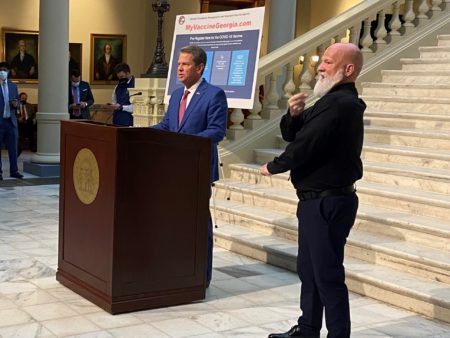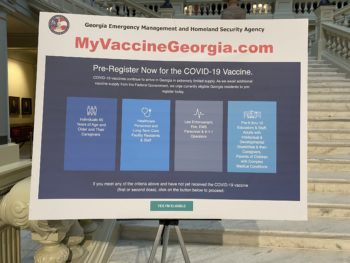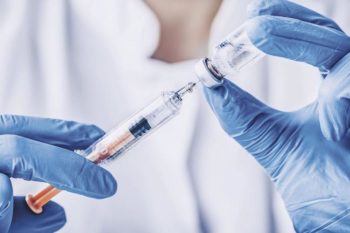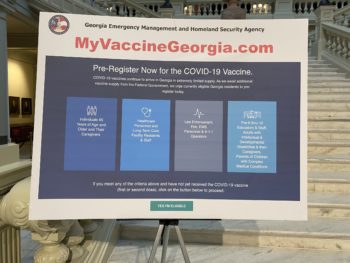Gov. Brian Kemp, as expected, is adding educators to the state’s COVID vaccine priority list.
But the governor also is expanding eligibility for other groups: adults with intellectual and developmental disabilities and their caregivers; and parents of children with complex medical conditions.
They will join K-12 educators and staff of public and private schools, and pre-school and child care educators and staff, as able to get a vaccine shot starting March 8.

Kemp, in a news conference Thursday at the state Capitol, pointed to Georgia’s improving COVID numbers, along with a growing supply of vaccine, as he announced the groups that will be added to the eligibility list.
He said the newly eligible Georgians will number about 1 million. Currently, 2 million people in the state are eligible for the vaccine, including seniors and health care workers.
Vaccinating educators will help schools reopen fully, Kemp emphasized.
Schools’ reliance on remote learning rather than classroom instruction is “leaving too many children behind, and parents literally at wit’s end,’’ Kemp said. “We need every student back in the classroom, five days a week, statewide.’’
The Professional Association of Georgia Educators and the Georgia Association of Educators applauded the governor’s move. Those groups, along with many school superintendents, have urged him to make teachers eligible for vaccines, saying it would enhance classroom safety.
“There will be a reduction of spread’’ of the disease, said Mike McGowan, an official with Cherokee County School District who attended the news conference.
“This is obviously outstanding news for the over 114,000 teachers and thousands of in-school personnel throughout the state of Georgia,” said Lisa Morgan, president of the Georgia Association of Educators.
Sign-ups for school employees and others newly eligible can begin Friday at MyVaccineGeorgia.com, state officials said.
Kemp said the state would work with local school systems that want to set up a vaccination plan for their employees.
More vaccine coming
COVID hospitalizations have decreased, and “other trend lines continue to move in the right direction,’’ Kemp said. The two-week test positivity rate for the virus is 8.4 percent, part of the downward trend.
And though a new vaccine, from Johnson & Johnson, is expected to be approved soon, “we’ll continue to see more demand than supply,’’ Kemp said.

More than 800,000 Georgia seniors have received at least one vaccine dose, which is about 57 percent of the state’s 65-and-older population, officials said. The two vaccines currently in use in the United States require two doses, spaced apart, though the Johnson & Johnson variety requires only one shot.
The state will consult with pediatric hospitals to determine which children have medical conditions complex enough to allow their parents to be eligible for vaccines.
Later in March, the state plans to expand eligibility to more Georgians under age 65 who have “high-risk’’ medical conditions.
Educators have been expected to be added to the vaccine priority list since last week, when Kemp noted that a recent state survey of 171,000 educators found that just 45 percent of school staff would take a vaccine.

But a survey by the Professional Association of Georgia Educators found that two-thirds of the 9,000 educators who responded said they wanted to be vaccinated. The percentage of those seeking a vaccine is higher in metro Atlanta than elsewhere in the state, said Margaret Ciccarelli of PAGE.
This week, a CDC report on Marietta City Schools’ COVID cases said educators were a prime factor in transmissions there. The researchers concluded that vaccinations of teachers, along with school mitigation measures, “is a critical component of preventing in-school transmission.’’
Separately, the state Department of Public Health announced the creation of a COVID Health Equity Council. The group will help DPH ensure equity in COVID-19 vaccination distribution and administration, and improve outreach and communication within the communities most affected by the virus.
The council will work in partnership with the 18 public health districts to reach communities of color and vulnerable populations with the goal of addressing concerns related to the COVID vaccine, state officials said.
The group will be chaired by Dr. Valerie Montgomery Rice, president and dean of Morehouse School of Medicine in Atlanta.

